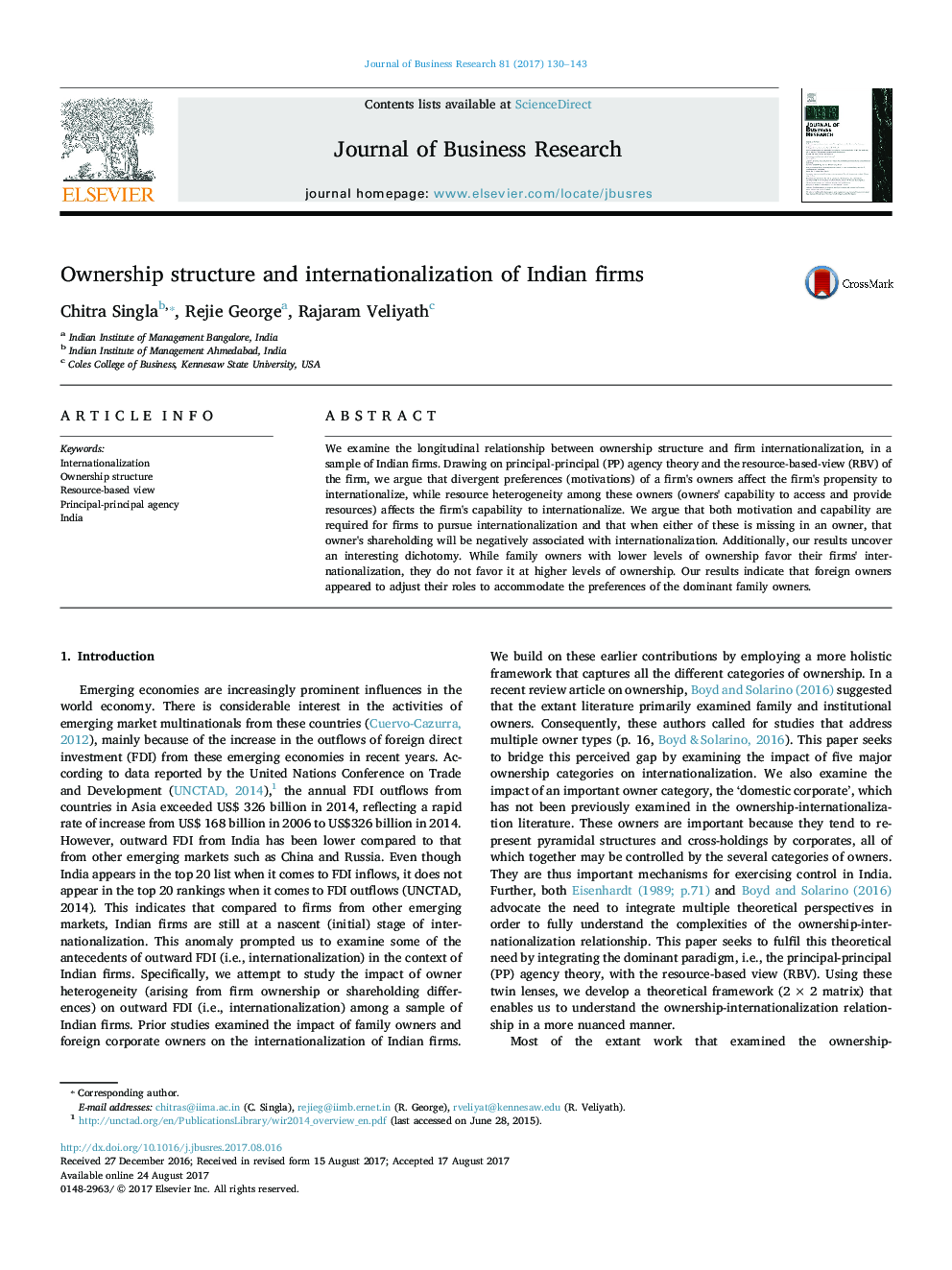| کد مقاله | کد نشریه | سال انتشار | مقاله انگلیسی | نسخه تمام متن |
|---|---|---|---|---|
| 5109372 | 1482840 | 2017 | 14 صفحه PDF | دانلود رایگان |
عنوان انگلیسی مقاله ISI
Ownership structure and internationalization of Indian firms
ترجمه فارسی عنوان
ساختار مالکیت و بین المللی بودن شرکت های هند
دانلود مقاله + سفارش ترجمه
دانلود مقاله ISI انگلیسی
رایگان برای ایرانیان
کلمات کلیدی
بین المللی شدن، ساختار مالکیت، دیدگاه مبتنی بر منابع، آژانس اصلی هند،
ترجمه چکیده
ما در رابطه با رابطه طولی بین ساختار مالکیت و بین المللی سازی شرکت در نمونه ای از شرکت های هند بررسی می کنیم. ما بر این اساس استدلال می کنیم که ترجیحات واگرا (انگیزه) صاحبان شرکت بر تمایل شرکت به بین المللی شدن تاثیر می گذارد، در حالی که ناهمگنی منابع میان این صاحبان ( توانایی مالکین برای دسترسی و ارائه منابع) بر توانایی شرکت در بین المللی تاثیر می گذارد. ما استدلال می کنیم که هر دو انگیزه و قابلیت لازم برای شرکت ها برای پیگیری بین المللی است و زمانی که هر یک از آنها در مالکیت از دست رفته باشد، مالکیت مالک آن به طور منفی با بین المللی شدن مرتبط خواهد بود. علاوه بر این، نتایج ما کشف یک تفاوت دو جانبه. در حالی که صاحبان خانواده با سطوح پایین تر مالکیت از بین المللی شدن شرکت هایشان بهره می برند، در سطح بالاتری از مالکیت، آن را به نفع خود نمی گذارند. نتایج ما نشان می دهد که صاحبان خارجی به نظر میرسد نقش خود را برای تنظیم ترجیحات صاحبان خانواده های غالب تنظیم می کنند.
موضوعات مرتبط
علوم انسانی و اجتماعی
مدیریت، کسب و کار و حسابداری
کسب و کار و مدیریت بین المللی
چکیده انگلیسی
We examine the longitudinal relationship between ownership structure and firm internationalization, in a sample of Indian firms. Drawing on principal-principal (PP) agency theory and the resource-based-view (RBV) of the firm, we argue that divergent preferences (motivations) of a firm's owners affect the firm's propensity to internationalize, while resource heterogeneity among these owners (owners' capability to access and provide resources) affects the firm's capability to internationalize. We argue that both motivation and capability are required for firms to pursue internationalization and that when either of these is missing in an owner, that owner's shareholding will be negatively associated with internationalization. Additionally, our results uncover an interesting dichotomy. While family owners with lower levels of ownership favor their firms' internationalization, they do not favor it at higher levels of ownership. Our results indicate that foreign owners appeared to adjust their roles to accommodate the preferences of the dominant family owners.
ناشر
Database: Elsevier - ScienceDirect (ساینس دایرکت)
Journal: Journal of Business Research - Volume 81, December 2017, Pages 130-143
Journal: Journal of Business Research - Volume 81, December 2017, Pages 130-143
نویسندگان
Chitra Singla, Rejie George, Rajaram Veliyath,
